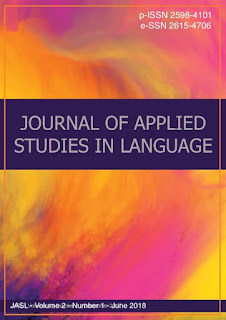Journal of Applied Studies in Language
Journal of Applied Studies in Language
2018-11-22
Journal of Applied Studies in Language [p-ISSN 2598-4101], [e-ISSN 2615-4706], [DOI 10.31940/jasl] is a peer review journal published by Politeknik Negeri Bali, Indonesia. It is published twice a year in June and December, since December 2017. Journal of Applied Studies in Language is focusing on research in languages (linguistics) and language teaching. The journal covers two main areas: Linguistics and Language Teaching. Linguistics, including, but not limited to, Phonology, Morphology, Syntax, Semantics, Literature, Pragmatics, Discourse Analysis, Language Acquisition, Sociolinguistics and Psycholinguistics and Language Teaching, such as First Language and Second Language Teaching, and Computer Assisted Language Learning (CALL).
Journal of Applied Studies in Language is indexed by DOAJ, GOOGLE SCHOLAR, IPI / GARUDA, EBSCO.
Journal of Applied Studies in Language, http://ojs.pnb.ac.id/index.php/JASL link: http://ojs.pnb.ac.id/index.php/JASL
 |
| Journal of Applied Studies in Language |
Learners’ models enhance the development of learners’ reading and thinking strategies
Abstract
This study was conducted to find the efficient way to teach academic reading skills to non-English department students at tertiary education. Based on the previous study, it was found that the students found difficulty in reading academic texts because of their limited vocabulary. Reading experts state that “good readers are good guessers” (Nation, 2002). Further, he claims that the strategies of guessing meaning from context is important strategy in reading. Considering these statements, this study investigated reading class by teaching the strategies of guessing meaning from context. Since this study was conducted to solve the students’ perceived problem when reading academic texts, it applied three-cycle qualitative inductive action research together with the students. These three cycles were: Cycle 1, the lecturer provided individual model of strategies, namely identifying parts of speech, finding clues from contexts, and identifying word parts; Cycle 2, the lecturer showed various models and gave practices; and Cycle 3, some selected students demonstrated their models to the class. Throughout this study, the students were encouraged to write journals explaining the strategies applied when they were guessing the meanings of words. The data was analysed from the students’ journals collected at the end of each cycle. The results indicated that the students’ models were more efficient than the lecturer’s. Learning and showing the strategies of guessing words from context encouraged the students to develop their deep thinking strategies when reading academic texts. The focus of this papers on the treatments to introduce the word guessing strategies to the students in brief.
Comments
Post a Comment